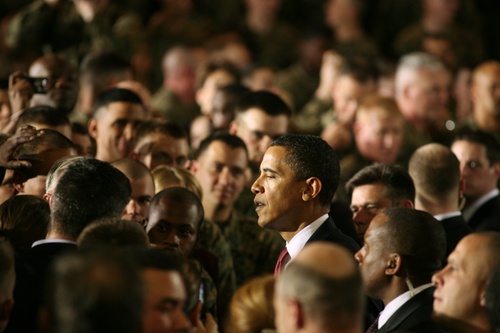Last week was so crowded with incident, to purloin a phrase from Lady Bracknell, that I should ask your forgiveness for giving the Friday Iraq speech short shrift. On review, it was as politically inspired as the non-SOTU - while grappling with, in many ways, a much more difficult proposition. Obama did two things, it seems to me. He gave the neocon wing everything he could without proposing a permanent occupation or protectorate. He postponed serious withdrawal of troops until this time next year to give the Iraqis a chance to have a second election. He was extremely generous, as he should have been, to the soldiers whose task it has been to achieve what is, if we are honest, a close-to-impossible feat: nation-building a non-nation after a period of ethnic cleansing. Obama acted like a president, in other words, not a candidate. He sees the necessity for bringing the military along, for treating it with respect, and finding a way to bridge its two needs: to get the hell out while feeling that it hasn't all been for naught. In the end, even John "white flag of surrender" McCain gave his blessing:
As the Republican presidential nominee, McCain clashed with Obama over U.S. involvement in Iraq, at one point saying that the Democrat would “rather lose a war than lose a campaign.” McCain said today that, given the president’s willingness to reassess if conditions change, “I am cautiously optimistic that the plan as laid out by the president can lead to success.”
This is crucial, because it undermines the Dolchstoss card the neocon right was prepared to play against Obama if he withdrew peremptorily. I might as well say up-front, as the card-carrying pessimist around here, that I fully expect some kind of blood-letting as we depart, and I do expect some on the right to call Obama a feckless, Carter-like surrender-monkey if he sticks to it.
But it is hard to argue with a candidate who ran on withdrawal, became the nominee because of it, and is prepared to give the military the most reasonable time-table imaginable to achieve it with minimal cost. That's the genius of his strategy and it's of a piece with his general approach: give the other side as much as it wants, apart from the core principle.
This is the bottom line:
As I have long said, we will retain a transitional force to carry out three distinct functions: training, equipping, and advising Iraqi security forces, as long as they remain non-sectarian; conducting targeted counterterrorism missions; and protecting our ongoing civilian and military efforts within Iraq. Initially, this force will likely be made up of 35,000 to 50,000 U.S. troops. Through this period of transition, we will carry out further redeployments. And under the status-of-forces agreement with the Iraqi government, I intend to remove all U.S. troops from Iraq by the end of 2011.
This is, to my mind, the really important point, uttered by a president we have good reason to actually believe. The will to achieve this, whatever happens in Iraq when we do, is the critical thing. There will come yet another moment when, as the last troops prepare to leave, an op-ed from O'Hanlon and Pollack will duly emerge saying: just a little more time. And McCain will bluster; and Boot and Kagan and Kristol will jump up and down. And the internationalist left will wail about potential genocide. And Obama will have to stick to his clear commitment. If he does that, if he can actually remove all forces from Iraq in his first term, he will win eternal gratitude.
(Photo: President Barack Obama moves through a crowd of Marines and other military personnel at the largest Marine base on the East Coast on February 27, 2009 in Camp Lejeune, North Carolina. By Logan Mock-Bunting/Getty Images.)
